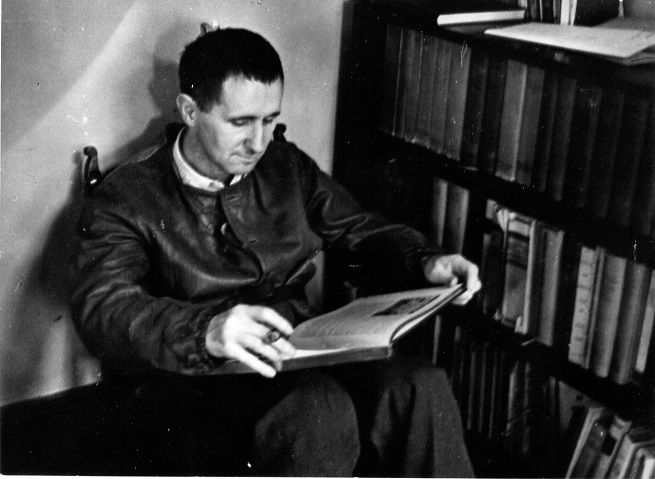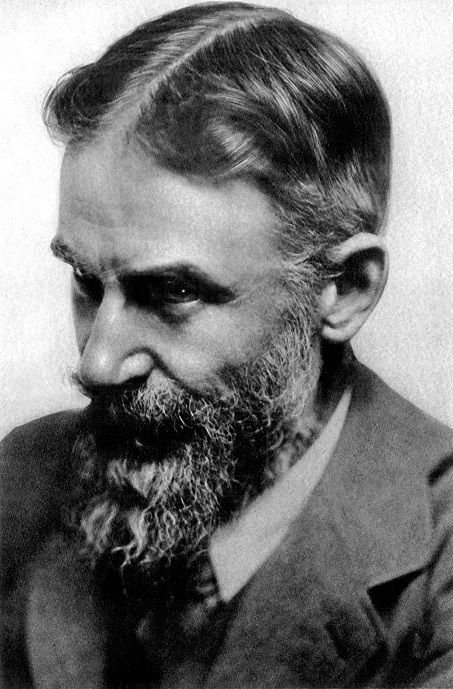Bernard Shaw through the eyes of Bertolt Brecht
The creative path of Bertolt Brecht, who lived from 1898 to 1956, began to take effect after Germany's defeat in World War I. Rugged, hungry, he left his family, carrying the "cold of the woods" - as he himself says - he becomes a kid on the streets and lived as a pop singer in the literary cabaret of the Munich comedian Carl Valentin. Not yet known, hidden behind the steel frames of his cheap glasses, Brecht sings his own ballads, among them the famous Legend of the Dead Soldier. His friends from that time described him as a man made up of fire and ice, full of contradictions and strangeness - lonely, almost inadequate of deep feelings towards loved ones, and yet constantly surrounded by admirers and collaborators; irresistible donjuan in the nightlife and at the same time puritan, an enemy of sensual joys; with an ugly and neglected appearance and yet appealing to all; painfully sensitive, kind and polite to one, but unrestrained and unbearably cruel to others ...

Here are some of the questions asked by young Brecht in his first works: Why is this whole effort of life? Is not a man alien in this world? Is not life just a theater scene on which you appear for a while - meaningless and purposeless? Is not existence an annoying habit, devoid of lasting significance? These questions torture a whole generation, experiencing the horror of war, lost all hope and moral resilience. This is the time when Bertolt Brecht writes one-act plays, works on film scenarios and publishes theatrical criticism. This is the time when his drama "Drums in the Night", which received the Heinrich von Kleist literary award, is on stage. Then Brecht was taken to the Berlin Shari hospitals to treat him with malnutrition. Because even when he tastes the glory, he keeps his posture as a literary lover. The world-renowned poet, playwright, writer, theatrical theorist Bertolt Brecht is still only a semi-anonymous author of more scandalous than artistic texts. For him, Lyon Feuchtwanger remembers that he was a young man, scowling, shriveled and distracted, unable to find a place, spoke in Swabian dialect, wrote a play, and the faces in it spoke an ultra-modern language, wild and powerful, full of color and strength , not drawn from the books, but ripped straight out of the mouth of life.
Then the twenty-eight-year-old Bertolt Brecht writes his short essay about George Bernard Shaw. The Irish playwright is just over seventy years old and his glory is enormous. His plays are translated and played in Germany continuously. Brecht has mixed feelings about him - admiration for his talent and disagreement with his political views, enthusiasm for his grandeur and irony because of his stunted attitude, respect for the power of his speech, and dislike of his cultural dictatorship. That's why his essay carries the ambiguous title "Ovations for Shaw." True to his quest to shock the readers and to squeeze them out of the state of simple praise for the acknowledged values, Bertolt Brecht presents Bernard Shaw more - and less - as a Terrorist. But he immediately makes a point: Shaw's terrorism is extraordinary and serves an unusual weapon, namely humor. The great Irishman seems to suggest that we should not be afraid of this world except from the calm and incomprehensible eye of the ordinary man. This position gives him a great natural advantage, and with its consecutive imposition he has succeeded in achieving one: none of the people who have met him in fact through books or theaters can not imagine that Shaw is capable of doing something without fear of this incorruptible eye. That's why any attack on Shaw's habits, even if it's a special kind of lingerie, inevitably ends with a defeat for criticism. Brecht believes that Shaw has gained the greatest possible degree of personal freedom with his unwavering attitude towards really important phenomena in life. Shaw's terror is that he recognizes the right of every person to act comfortably, logically and with a sense of humor, but he considers his own to do so even when his behavior would stir up general indignation. According to Brecht, the Irish playwright knows very well how much courage is required to laugh at the ridiculous, and how serious it is to find funny. And like all people who pursue their purpose, he knows the burden of seriousness, inherent only in literature. What's more: despite his sense of humor, Bernard Shaw is filled with deep and angry fears. Brecht continues his essay with the observation that the views of what was destroyed during the Shaw era seem to be the most lasting. But the great Irishman finds no place for a martyred crown on his own head. His literary work does not leave him alive. On the contrary. The impact of his inimitable cheerfulness and his contagious good mood is exceptional. One has the feeling that Shaw's spiritual and bodily health grows with every written sentence. Although the reading of his works does not deliver Dionysian intoxication, he is undoubtedly healthy, notes Brecht. And he adds, "Shaw's belief that humanity is infinitely amenable to improvement plays a crucial role in his works." For the young Bertolt Brecht, whose name in just two decades will be mentioned in one breath with that of the Irish playwright, Bernard Shaw's spirited mind and the eerie eloquence deserve full confidence.

In this way, the future master of the "epic drama" expresses his excitement of Shaw's personality and literary power while distancing himself from his work and social views. Because Brecht accepts only the LIFE BEHAVIOR as a basic criterion for assessing the human being. Like the eighteenth century enlighteners, he is convinced of the power and possibilities of human reason. But Brecht does not believe in Cartesian logic, giving too little social fruits, but in a historical-dialectical mind that seeks to explain the world so that it can be changed. Like Bernard Shaw, Brecht assigns his works certain didactic tasks. But while the Irish playwright's goal is to incite the audience to a critical reflection on interpersonal relationships corrupt by the power of money, Brecht wishes to push the viewer into a wise and at the same time active behavior that unites the stoic hardness and incorruptibility of ancient philosophers with the cheerful the urge to a happier life for the average street man.
"The ovations for Shaw" essay is neither an analysis of the great dramaturg's creative method nor a study of his ideas, nor an "explanation in love" - young Brecht now draws the contours of a new theater to dedicate himself to his life. A theater that will open to the ordinary viewer a field of personal criticism in deriving the so-called "morality" from the work. Unlike Shaw, who wants to change our attitude towards the world, Brecht is filled with the bold confidence that with the help of literature he can contribute to the change of this imperfect but beneficial correction world.
WARNING! The comment below by @miky leads to a known phishing site that could steal your account.
Do not open links from users you do not trust. Do not provide your private keys to any third party websites.
ok now I like you godflesh. Brecht is my jam.
"Nowadays, anyone who wishes to combat lies and ignorance and to write the truth must overcome at least five difficulties. He must have the courage to write the truth when truth is everywhere opposed; the keenness to recognize it, although it is everywhere concealed; the skill to manipulate it as a weapon; the judgment to select those in whose hands it will be effective; and the cunning to spread the truth among such persons. These are formidable problems for writers living under Fascism, but they exist also for those writers who have fled or been exiled; they exist even for writers working in countries where civil liberty prevails."
You are welcome! :) Thanks for the quote!
wow very good article my friend
thanks
Very nice article my friend,
Thank you :)
You got a 11.27% upvote from @postpromoter courtesy of @godflesh!
Want to promote your posts too? Check out the Steem Bot Tracker website for more info. If you would like to support the development of @postpromoter and the bot tracker please vote for @yabapmatt for witness!
Awesome post! I invite you to visit our blog and vote us back! And of course to enjoy our content :)
sure :)
deleted